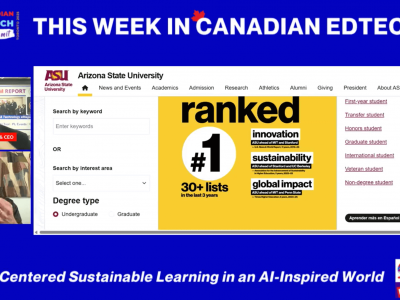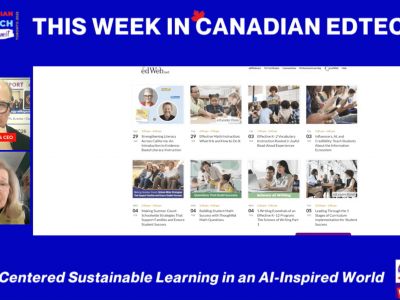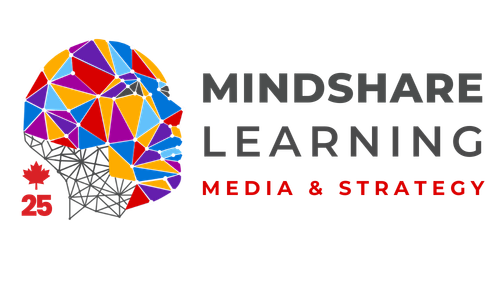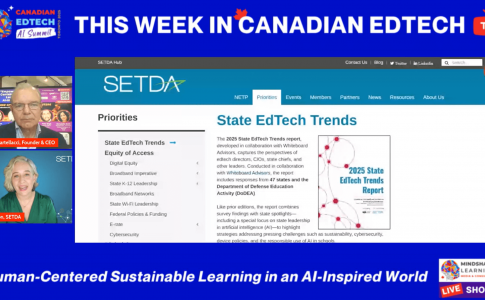Edsby Teacher AI Assistant Review – By Timothy Gard, Chief Learning Strategist
Edsby is making waves once again in the realm of educational technology. Known for its rapid rise as a leading student learning management system and recognized with multiple industry awards, Edsby has now taken a significant step forward by introducing an innovative feature: the Teacher AI Assistant. This addition reinforces Edsby’s status as a comprehensive K–12 learning management and analytics platform, catering to educators, students, administrators, and parents’ varied needs.
The Teacher AI Assistant represents Edsby’s commitment to integrating cutting-edge artificial intelligence within the educational landscape. This tool enhances teaching practices, streamlines administrative processes, and creates a more productive learning environment. By automating routine tasks and providing actionable insights, the AI Assistant empowers educators to focus on what truly matters—engaging with students and fostering their academic growth.
This review will critically analyze the effectiveness of Edsby’s AI innovation. We will explore how well the tool aligns with pedagogical practices, improves operational efficiency, safeguards data privacy, and elevates the user experience. This exploration is tailored for educators, educational leaders, curriculum developers, and decision-makers in the ed-tech sector, all eager to understand how AI can be seamlessly integrated into school systems to enhance academic outcomes.
Edsby was established in 2010 by a team of Canadian software engineers with extensive experience in the education technology sector. The platform has since grown to serve schools and districts across North America and internationally. Its core strength lies in unifying communication, assessment, attendance, and learning tools in one secure, cloud-based system tailored specifically for K–12 education. With the Teacher AI Assistant launch in April 2025, Edsby extends its mission by incorporating generative AI to streamline instructional and administrative workflows. This tool represents a significant innovation in how LMS platforms can support educators by minimizing time spent on repetitive tasks and providing intelligent assistance with classroom communication and evaluation.
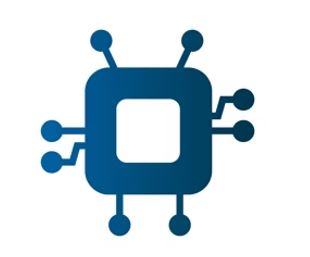
Figure 1 Edsby flags every Teacher AI Assistant feature with an AI icon, visible in the text composer, assessment generator, report-card comment editor, and other tool panels.
The Teacher AI Assistant offers several features to reduce educators’ routine workload while enhancing instructional communication and planning. Notably, the tool supports automatically generating classroom posts, journal entries, and announcements. It can also adapt tone and format to suit specific audiences, such as creating messages in formal language or playful styles, even mimicking literary voices like Dr. Seuss’s.
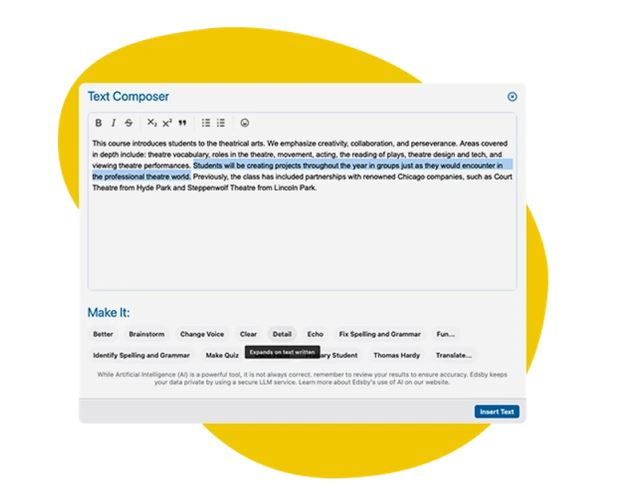
Figure 2 When teachers click the AI Assistant button in the Edsby note composer, the platform instantly generates—or refines—age-appropriate prose tailored to their students. Because Edsby already knows each class’s grade level and curriculum, its content aligns seamlessly with the teacher’s instructional needs.
The AI Assistant streamlines a range of assessment tasks for educators. Teachers can swiftly create multiple-choice or short-answer quizzes, customize each item and verify that every question aligns with curricular expectations. Built-in translation features facilitate clear communication with language learners and multilingual families, fostering an inclusive classroom environment. When evaluating student writing, the Assistant identifies grammar and structure issues, providing an editable draft that teachers can refine before sharing. It also analyzes student data to draft individualized, asset-based report-card comments that meet current reporting standards. Together, these capabilities save time while enabling teachers to tailor materials and feedback to their students’ needs.
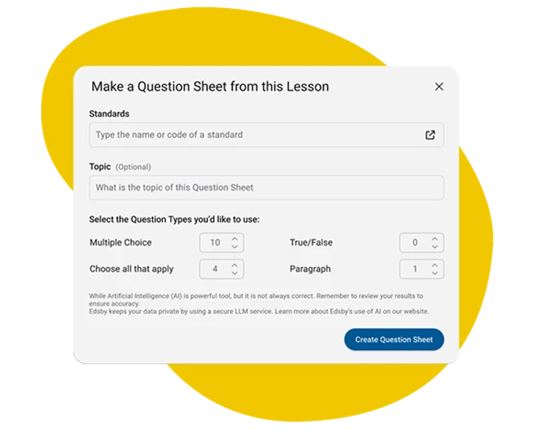
Figure 3 Edsby automatically builds complete online quizzes based on the curriculum standards already linked to each class. Teachers choose the question formats and any other settings, and the system generates the assessment for them—no manual uploading is required, unlike Google Classroom.
Edsby has taken a privacy-conscious approach by deploying the AI on Microsoft’s Azure OpenAI platform. This ensures that no school data is shared with public AI models and that generated content is kept securely within the Edsby ecosystem. The transparency and safety of these practices are critical, particularly for K–12 environments that must safeguard student data under strict provincial and national privacy laws.
One of the most commendable aspects of the Teacher AI Assistant is its seamless integration within Edsby’s existing platform. It does not require educators to switch between applications or learn new software, making it accessible for teachers with varying degrees of technological comfort. The AI Assistant is an optional add-on within familiar content creation interfaces such as post editors, grade books, and comment fields. This embedded model reduces friction and allows users to adopt AI support incrementally. The user interface is designed for clarity, with easily accessible prompts and customization options.
The Teacher AI Assistant holds considerable pedagogical promise by streamlining routine tasks, allowing educators to focus on instructional quality. Teachers often spend significant time preparing reports, generating assignments, and composing messages to families. With the AI’s support, these tasks can be completed more efficiently without sacrificing personalization. For example, the Critique Writing tool streamlines grading by automatically analyzing PDF submissions and returning instant feedback on spelling, grammar, and overall quality. With prompts such as “General Critique” or “Provide a detailed summary of spelling and grammar errors,” teachers quickly spot recurring issues, target individual learning gaps, and devote more time to higher-order skills like critical thinking and analysis. This AI-driven support accelerates marking, sharpens the relevance of feedback, and ultimately lifts student performance.
The Summarize Thread tool reduces review time by condensing lengthy class or group discussions into instant, teacher-selected digests. Instead of scrolling through every post, educators choose the format that best serves them: a Narrative recap, bullet-point Highlights, actionable Next Steps, a breakdown of competing Arguments, or a concise Outcome.
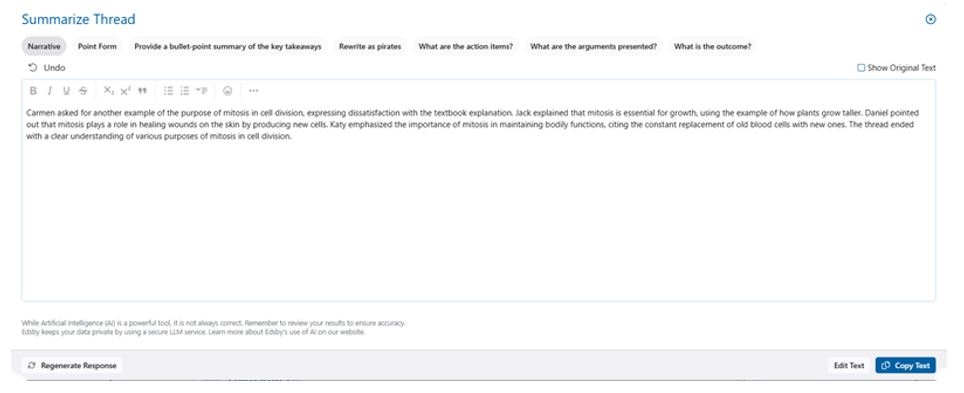
Figure 4 The Summarize Thread function condenses lengthy class discussions into instant highlights, giving teachers the key points, action items, and outcomes at a glance.
The AI also contributes to pedagogical goals by facilitating the design of varied assessments, thereby supporting differentiated instruction. The tool is a thought partner in lesson planning by proposing quiz questions, scaffolded prompts, or reflective exercises. Its translation capabilities and stylistic adaptations support equitable communication with families from diverse linguistic backgrounds.
Edsby is contemplating student-facing AI tools such as a “Content Coach” for writing support and an “Ask Edsby” chatbot for navigating school-related inquiries. These developments could further expand the pedagogical impact by promoting student agency and reinforcing media literacy and self-regulated learning skills.
Since its release in April 2025, the Teacher AI Assistant has generated interest among school leaders and early adopters. In early feedback, educators have described it as a helpful assistant that encourages new approaches to communication and assessment. Principal Dan Mielke described it as providing nudges toward perspectives he might not have otherwise considered.
Edsby’s positioning of its AI tool as a secure, internal feature sets it apart from general-purpose AI applications like ChatGPT or Bard, which are not built for educational contexts or privacy compliance. In this respect, Edsby is committed to sector-specific solutions that address real classroom needs while observing legal and ethical standards.
Accessibility accommodations could be more explicitly addressed. For example, read-aloud functions, alternate display modes, or input options for neurodiverse learners would enhance inclusivity. Moreover, while the AI tool supports tone adaptation and translation, its responsiveness to cultural context and bias in generated text requires careful monitoring.
Another potential shortfall lies in the explainability of AI decisions. Educators benefit from understanding how AI suggestions are generated, particularly when using them to inform pedagogical decisions. Transparent model behaviour, editable prompt templates, and meta-commentary on AI outputs would contribute to teacher trust and ethical implementation.
The Teacher AI Assistant from Edsby represents a thoughtful and innovative approach to integrating artificial intelligence into K–12 educational workflows. Its design is well-aligned with the platform’s broader mission of simplifying and enriching the educator experience while preserving data security and regulatory compliance.
Edsby has emerged as a transformative tool in the education landscape, primarily recognized for its capability to reduce teachers’ workloads through advanced technological innovations. By harnessing intelligent planning, automated communication, and evaluation processes, Edsby streamlines administrative tasks and enables educators to devote more time and energy to their core responsibility—teaching. This efficiency promotes a more effective learning environment and allows teachers to focus on nurturing student engagement and academic success.
Looking ahead, the potential of Edsby continues to expand, especially as student-facing AI features are developed and rolled out. These advancements could position Edsby as a pioneering model for the responsible and pedagogically aligned use of artificial intelligence in educational environments. By focusing on creating AI systems that are not only effective but also ethically sound and inclusive, Edsby is poised to set a precedent for how AI can be leveraged to enhance learning while supporting educators. The platform will likely redefine educational technology standards as it evolves, ultimately transforming how students and teachers interact in the digital age. As always, well done, Edsby!



